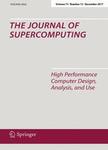版权所有:内蒙古大学图书馆 技术提供:维普资讯• 智图
内蒙古自治区呼和浩特市赛罕区大学西街235号 邮编: 010021

作者机构:Dongguk Univ Dept Comp Sci & Engn 30 Phildong Ro 1gil Seoul 04620 South Korea Seokyeong Univ Dept Comp Engn 124 Seokyeong Ro Seoul 02713 South Korea
出 版 物:《JOURNAL OF SUPERCOMPUTING》 (超高速计算杂志)
年 卷 期:2020年第76卷第7期
页 面:5259-5275页
核心收录:
学科分类:0808[工学-电气工程] 08[工学] 0812[工学-计算机科学与技术(可授工学、理学学位)]
基 金:Ministry of Science, ICT and Future Planning, MSIP, (2016R1A2B4008392, 2017R1C1B5018257) National Research Foundation of Korea, NRF Ministry of Science and ICT, South Korea, MSIT, (2018R1A5A7023490)
主 题:Internet of things Cloud system Computational offloading Virtual machine
摘 要:This paper presents an internet-of-things (IoT)-cloud converged virtual machine (VM) system for IoT devices with restricted computing resources. The VM is a software processor that has many advantages in terms of software development, release, maintenance, etc., owing to its platform independence. However, in low-performance devices it has a significant disadvantage because its use is restricted by high execution overheads at the software interpretation level. This paper proposes a VM system for IoT devices that solves this problem while retaining the advantages of VM technology using a lightweight interpreter model and cloud-based computation offloading. The proposed interpreter solves the limited memory/performance problem when running VMs on low-performance devices using two-level instruction-to-native function matching techniques. Furthermore, by solving the low-performance issues of IoT devices using cloud-based offloading, the proposed IoT-cloud VM can run applications that require high-performance computing even when the target hardware system is a low-power IoT device.